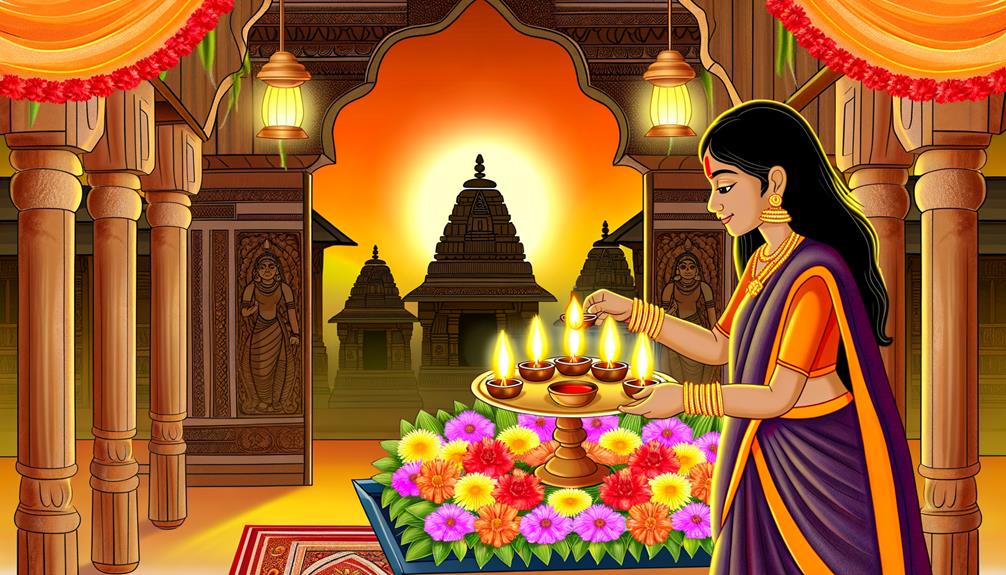Aarti Name Meaning in English
The name Aarti originates from the Sanskrit word 'Ārātrika,' symbolizing the act of dispelling darkness with light, a fundamental concept in Hindu rituals. Aarti is a significant cultural practice, expressing reverence and devotion through the circular movement of lit lamps before deities.
This ritual embodies spiritual beliefs, aiming to eliminate ignorance while invoking divine blessings. It is prevalent in Hindu festivals, enhancing communal bonds and reinforcing cultural identity.
Choosing the name Aarti connects one deeply to these rich traditions and values. Discover more about this name's profound implications and historical context in the continuum of cultural practices.

Key Takeaways
- Aarti derives from the Sanskrit word 'Ārātrika', meaning the removal of darkness and the dispersion of light.
- The name Aarti symbolizes devotion, grace, and intellectual prowess, reflecting cultural and spiritual reverence.
- It is associated with a Hindu ritual involving the circular waving of lighted lamps to deities, symbolizing the triumph of light over darkness.
- Aarti holds significant cultural importance in Hindu festivals, reinforcing spiritual beliefs and community cohesion.
- The name carries connotations of purity, divine blessings, and human aspiration for higher spiritual enlightenment.
Origin and Etymology
The name Aarti, rooted in the Sanskrit language, holds significant cultural and religious connotations within Hindu traditions. Etymologically, Aarti (आरती) derives from the Sanskrit word 'Ārātrika,' which signifies the act of removing darkness or dispersing light. This term is often associated with a Hindu ritual involving the waving of lighted lamps before deities, symbolizing the dispelling of ignorance and the welcoming of divine blessings.
Embedded in this nomenclature is a rich tapestry of linguistic nuance and ceremonial importance, reflecting the intertwining of language and spirituality in Indian culture. The name Aarti encapsulates more than a mere identifier; it embodies a profound ritualistic essence that transcends the boundaries of everyday nomenclature, echoing deep-seated religious symbolism. To understand the true significance of the name Aarti, one must delve into its etymology and explore the meaning of Aarvi in English. This exploration will reveal the layers of symbolism and spiritual connotations that have been woven into the fabric of this revered name, shedding light on its deeper significance within Indian culture. By unraveling the linguistic and ceremonial complexities of Aarti, one can gain a greater appreciation for the intertwined dynamics of language and spirituality in this rich and ancient tradition.
Cultural Significance
The name Aarti is deeply embedded in Hindu cultural practices, particularly as it relates to the ceremonial worship ritual known as Aarti, which involves the offering of light to deities.
Symbolically, Aarti represents the dispelling of darkness and ignorance, and it holds a significant place in various religious festivals, underscoring its importance in communal and familial worship.
This ritualistic practice not only reinforces spiritual beliefs but also strengthens cultural cohesion through shared religious observances.
Hindu Worship Ritual
In Indian culture, the ritual of Aarti holds profound significance as a ceremonial practice symbolizing the offering of light to deities, encapsulating the essence of devotion and reverence within Hindu worship. This ritual, performed with lit lamps or candles, involves circular motions before a deity's image, accompanied by devotional hymns and chants.
Ethnographically, Aarti serves as a communal expression of faith, uniting worshippers in a shared spiritual experience. The practice transcends mere ritualistic actions; it is imbued with cultural heritage, fostering a collective sense of identity and continuity.
Aarti not only venerates the divine but also reinforces social bonds, reflecting the intertwined nature of spirituality and community in Hinduism.
Symbolism of Aarti
Beyond its ritualistic execution, Aarti encapsulates profound cultural symbolism, representing the triumph of light over darkness and the dispelling of ignorance through spiritual enlightenment.
In the ethnographic context, the act of circling the lighted lamp in front of deities signifies human aspiration for divine blessings and protection. The flames of Aarti symbolize the sacred fire, an ancient Vedic element associated with purity and transformation.
This ritual also embodies the collective consciousness of the community, as it is often performed in congregational settings, reinforcing social bonds and shared spiritual values. Through Aarti, practitioners express devotion and gratitude, fostering a sense of inner peace and unity that transcends individualistic boundaries, connecting them to a larger cosmic order.
Aarti in Festivals
During major Hindu festivals, Aarti assumes a central role, encapsulating the essence of communal worship and cultural heritage. This ritual, often performed with oil lamps, flowers, and incense, serves as a conduit for collective spiritual expression.
Observed during Diwali, Navratri, and Ganesh Chaturthi, Aarti harmonizes the physical and metaphysical domains, invoking divine blessings. Ethnographically, it is a performative act that reinforces community bonds and cultural continuity.
The rhythmic chanting and melodic hymns during Aarti create an immersive environment, fostering a shared sense of devotion and reverence. Therefore, Aarti during festivals not only venerates deities but also perpetuates cultural traditions, making it an indispensable element of Hindu religious observance and social cohesion.
Religious Context
In the religious context, Aarti holds a pivotal role in Hindu worship rituals, serving as an act of reverence towards deities.
During Aarti, devotees offer light from wicks soaked in ghee or camphor, symbolizing the removal of darkness and ignorance.
This ritual is imbued with profound significance, reflecting the interplay between the symbolic illumination and the spiritual aspirations of the worshippers.
Hindu Worship Rituals
Hindu worship rituals, known collectively as 'puja', are deeply embedded in the cultural and spiritual fabric of Hindu society, reflecting centuries of tradition and devotion. These rituals encompass a series of intricate ceremonies that involve offerings, chants, and prayers, serving as a means to communicate with the divine.
Puja can be conducted in homes, temples, or even in open spaces, and often involves the use of sacred items such as flowers, incense, and lamps. Each element in the ritual has symbolic significance, representing various aspects of the cosmos and human existence. This practice not only reinforces religious beliefs but also strengthens community bonds, offering a structured way to express reverence and seek blessings.
Deities in Aarti
Aarti, a prominent component of Hindu worship rituals, is performed in reverence to various deities, each embodying distinct aspects of the divine and the universe.
The ritual typically honors gods and goddesses such as Vishnu, Shiva, Lakshmi, and Durga, each representing fundamental cosmic principles. Vishnu is revered as the preserver of the universe, while Shiva symbolizes destruction and regeneration. Lakshmi embodies wealth and prosperity, and Durga signifies strength and protection.
These deities are often depicted with specific iconography and mythological narratives that underscore their roles in the cosmic order. The selection of a deity for Aarti often reflects the devotee's spiritual inclinations and needs, emphasizing the ritual's deep-rooted cultural and religious significance.
Symbolism and Significance
The ritual of Aarti carries profound symbolic and religious significance, encapsulating the essence of devotion and the cyclical nature of the cosmos in Hindu worship practices. This sacred act involves offering light from wicks soaked in ghee or oil, symbolizing the removal of darkness and ignorance in the presence of divine wisdom.
The circular motion of the Aarti plate reflects cosmic cycles and the infinite nature of the universe.
- Light and Purity: Represents spiritual illumination and purity.
- Sound and Vibration: Chanting and ringing bells create a sanctified atmosphere.
- Circular Motion: Embodies the infinite nature of time and space.
- Offering and Surrender: Signifies humility and devotion to the divine.
- Communal Bonding: Strengthens collective worship and shared spiritual experience.
This ritual is integral to fostering a deeper, communal connection to the divine.
Symbolism of Light
Within the cultural practice of Aarti, light serves as a profound symbol representing purity, divinity, and the dispelling of darkness.
In ethnographic terms, the flame used in Aarti rituals embodies the essence of spiritual illumination, guiding participants towards elevated states of consciousness.
Culturally, the light signifies the presence of the divine, fostering a sense of connection between the earthly and the celestial.
This act of waving light before deities is not merely ritualistic but deeply symbolic, intending to ward off negative energies and invite spiritual clarity.
Observing Aarti, one witnesses the convergence of tangible light with metaphysical symbolism, highlighting its role in nurturing both individual and communal spiritual well-being.
Through the light, Aarti transcends mere tradition, becoming a beacon of inner and outer purity.
Modern Interpretations
In contemporary contexts, the practice of Aarti has evolved to reflect both traditional reverence and modern spiritual sensibilities, encapsulating a dynamic interplay between age-old customs and present-day interpretations.
This ritual, while rooted deeply in Vedic traditions, now often incorporates innovative elements that resonate with today's globalized spiritual landscape.
- Digital Aarti: Virtual platforms and apps for performing Aarti.
- Interfaith Practices: Inclusion of Aarti in multi-religious ceremonies.
- Environmental Concerns: Use of eco-friendly materials in Aarti rituals.
- Youth Engagement: Workshops and social media campaigns to engage younger generations.
- Cultural Fusion: Integration with contemporary art forms and music.
These adaptations underscore the enduring cultural significance of Aarti while demonstrating its capacity to evolve and remain relevant in modern society.
Popularity Over Time
Frequently celebrated across diverse cultures and historical periods, Aarti's enduring popularity highlights its profound cultural and spiritual significance. The name 'Aarti,' rooted in Hindu traditions, transcends time and geography, maintaining a steady appeal. Historically, the name's prevalence can be traced back to ancient rituals and devotional practices. In contemporary times, its usage reflects a blend of traditional reverence and modern adaptation. The following table illustrates the name's popularity over different eras and regions:
| Period | Region | Cultural Significance |
|---|---|---|
| Ancient Times | South Asia | Ritualistic and Devotional |
| Medieval Era | Indian Subcontinent | Spiritual and Cultural |
| Colonial Period | India | Resilience and Adaptation |
| Modern Times | Global | Cultural Integration |
This pattern underscores Aarti's adaptability and timeless relevance.
Famous Personalities
Prominent figures bearing the name Aarti have made significant contributions in various fields, underscoring the name's rich cultural heritage and enduring influence. These individuals embody the essence of the name, which often signifies devotion and benevolence. Their achievements span diverse domains, from arts and entertainment to academia, highlighting the name's versatility and depth.
- Aarti Chhabria: An acclaimed Indian actress and model, known for her roles in Bollywood films and television.
- Aarti Sequeira: A celebrated chef and television personality, winner of Food Network's 'The Next Food Network Star.'
- Aarti S. Bhaskara: A renowned academic and researcher in the field of environmental science.
- Aarti Bajaj: A prominent film editor in the Indian cinema industry.
- Aarti Mann: An American actress famous for her role in the TV series 'The Big Bang Theory.'
These individuals exemplify the cultural and professional diversity associated with the name Aarti.
Choosing the Name Aarti
Reflecting on the achievements of notable individuals named Aarti, it becomes evident that choosing this name carries a profound cultural and symbolic significance, often associated with devotion, grace, and intellectual prowess.
Derived from Sanskrit, 'Aarti' signifies a religious ritual of worship in Hindu traditions, embodying a deep sense of spirituality. Parents selecting this name for their child often wish to imbue them with values of reverence and humility.
Ethnographically, the name Aarti resonates within Indian communities, symbolizing a connection to heritage and cultural identity. Its widespread usage across various regions underscores its timeless appeal, blending traditional reverence with contemporary prominence.
Therefore, choosing the name Aarti reflects a meaningful intersection of cultural heritage and aspirational virtues.
Conclusion
Aarti, originating from Sanskrit, denotes a ritual of light and devotion in Hindu tradition. Symbolically, it represents the eradication of darkness and the welcoming of divine presence.
Modern interpretations often link the name to spiritual enlightenment and cultural heritage. For instance, a child named Aarti in contemporary India may embody both traditional values and modern aspirations.
Consequently, the name Aarti encapsulates a rich blend of historical depth and evolving significance in the cultural tapestry.






